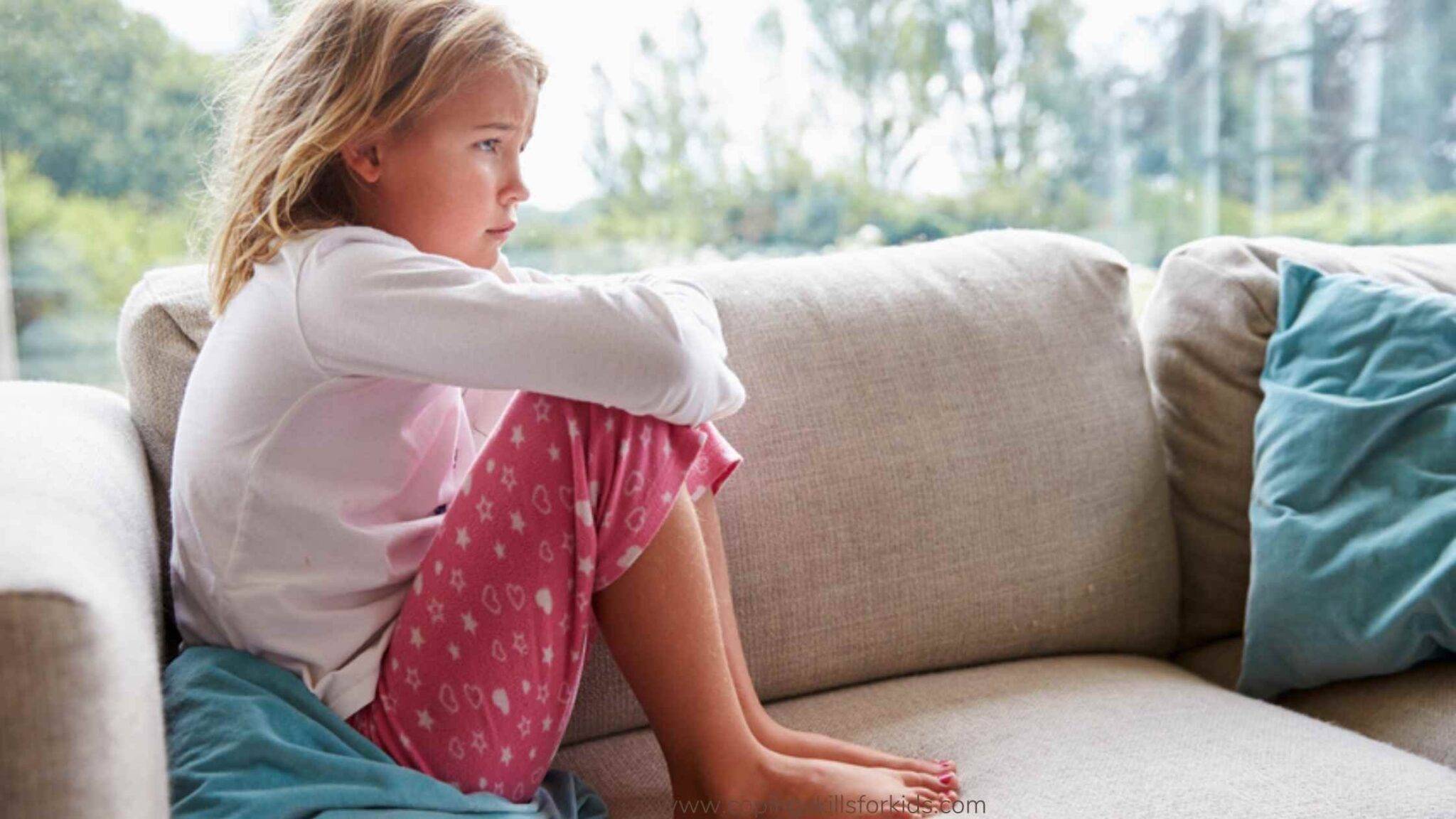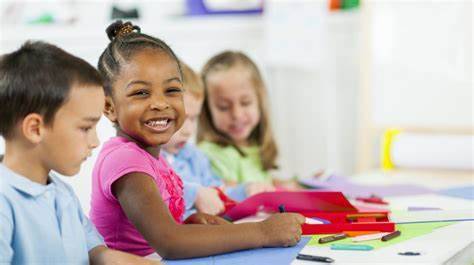Table of Contents
It is exceedingly vital to assist our children in traversing their emotions with tender concern and empathy. In a world brimming with trials and pressures, arming them with efficient coping mechanisms becomes imperative.
Our objective is to foster their emotional welfare, and we can accomplish this by providing a secure and supportive environment where their sentiments are respected and comprehended.
In this guide, we at Omega Pediatrics will explore various coping strategies that can significantly contribute to your child’s emotional development. Let us join hands in crafting a nurturing sanctuary for their growth and well-being!

How To Support Your Child’s Emotional Development
One of your most important roles is to support your child’s emotional development. Nurturing their emotional well-being sets the foundation for their overall growth and happiness. Here are some ways we can support our child’s mental health development:
Provide a safe and supportive environment.
Create an environment where your child feels safe to express their emotions without fear of judgment or criticism. Establish open lines of communication and cultivate a trusting relationship. This helps your child feel comfortable seeking guidance and support when needed.
Listen and validate their feelings.
Take time to actively listen to your child. Show genuine interest in what they have to say and validate their experiences. You can help them feel heard and valued, which promotes healthy emotional development.
Acknowledge your child’s emotions, even if you don’t fully understand why they feel that way! Let them know that it’s okay to experience a range of emotions and that their feelings are valid. This creates a safe space for them to express themselves and builds their emotional resilience.
Lead by example.
Be a positive role model for your child by managing your emotions. Demonstrate healthy ways of expressing and coping with feelings, including practicing self-care, engaging in open communication, and seeking support when necessary.
Your actions serve as a powerful example for your child to emulate.

Coping Strategies for Kids
In today’s fast-paced world, various challenges have the potential to stress kids, causing anxiety and overwhelming them. However, teaching them simple and easy coping strategies empowers them, enabling better management of their emotions.
1. Deep Breathing
Educate your child to engage in intentional, unhurried inhalations through their nostrils, followed by slow exhalations through their mouth. This uncomplicated technique aids in regulating their emotions and diminishing stress.
For instance, visualize inflating a balloon with each inhalation and gradually releasing the air, relinquishing tension. This deep respiration triggers the body’s relaxation response, leading to a decreased heart rate and blood pressure.
Deep breathing can be practiced at any time and in any place. So, it’s an easily accessible coping mechanism for children.
2. Mindfulness and Contemplation
Motivate your child to concentrate on the present and observe their thoughts and emotions without judgment, cultivating tranquility and self-awareness. They explore guided meditation or engage in mindful activities like coloring or listening to serene music.
This practice enables them to discover moments of peace amid the demands of their daily lives, paying attention to their internal experiences and the external environment. It also promotes relaxation, reduces anxiety, and enhances overall well-being.
3. Positive Self-Dialogue
Substitute negative thoughts with positive affirmations. By employing uplifting and encouraging language, they foster self-assurance.
Here’s an example. If your child makes a mistake, he can tell himself in his mind or aloud, “I exerted my best effort, and I’ll attempt it again next time. I possess the capacity to learn and grow.”
Positive self-dialogue aids children in cultivating a resilient mindset, fostering optimism and self-belief. It empowers them to overcome challenges and setbacks by directing their focus toward their strengths and abilities.
4. Artistic Expression
Artistic activities articulate your children’s emotions. Drawing, painting, or writing are means of self-expression. They create an image or compose a story that resembles their current emotional state, enabling them to externalize their feelings and attain clarity and comprehension.
Artistic expression provides children with non-verbal communication, conveying emotions that might be challenging to express verbally. They explore their inner world, process their experiences, and find solace in their creative pursuits.
5. Physical Activity
Children participate in activities they find enjoyable. They go cycling, dance, or engage in sports. Physical exercise releases endorphins, which can enhance your child’s mood and alleviate stress. Consistent physical activity offers a healthy outlet for emotional release.
It helps children manage stress, regulate their emotions, and boost their energy levels.
Whether playing outdoors, joining organized sports, or adhering to structured exercise routines, physical activities contribute to well-being and support emotional health.
6. Seeking Assistance
Your child should reach out to a trusted adult, friend, or counselor when they require assistance or someone to confide in. They share their concerns with a close friend or consult a school counselor or their primary care physician.
Seeking support encourages connection, fosters problem-solving, and helps your kids feel validated and understood. Let them know that they aren’t alone in their struggles and that seeking help demonstrates strength rather than weakness.
They gain different perspectives, receive guidance, and access support for navigating their emotions from these people.
7. Progressive Muscle Relaxation
Guide your child through the process of tensing and, subsequently, relaxing different muscle groups. This technique facilitates physical relaxation and can alleviate feelings of tension and anxiety.
For example, they can clench their fists and then gradually release the tension, systematically working through their body from head to toe, fostering calmness and relaxation.
Progressive muscle relaxation develops body awareness and releases tension. This is particularly useful when they feel overwhelmed or need to unwind before bedtime.
8. Visualization
Your child envisions a serene place. Think of a beach or a meadow, and mentally conjure the sights, sounds, and scents associated with that environment.
Visualization serves as a tool for relaxation, transporting their minds to a soothing realm and diminishing stress while fostering tranquility. They close their eyes and imagine the gentle sound of ocean waves, the warmth of the sun, or the aroma of flowers.
Visualization enables children to create mental images that evoke positive emotions, serving as a form of mental escape and rejuvenation.
9. Humor and Laughter
Your child finds humor in challenging situations. Laughter has a therapeutic effect on coping with stress. They watch a movie or share jokes with family and friends to lighten their mood. Discovering laughter amidst difficulties brings joy and maintains a positive outlook.
Humor and laughter offer benefits for children’s emotional well-being. They promote relaxation, release tension, and stimulate the production of endorphins, the natural mood enhancers. Laughter strengthens social bonds and fosters a positive and resilient mindset.
10. Developing Problem-Coping Strategies
Problem-solving techniques equip your child with skills for handling challenges. Break down a problem into smaller steps and explore alternative solutions. By empowering them to think critically and develop coping strategies, they can approach difficulties with confidence.
For example, if they feel overwhelmed by homework, they prioritize tasks based on deadlines and create a study schedule. This approach helps them tackle their workload systematically, alleviating stress and cultivating a sense of accomplishment.
11. Play Therapy
Play, as a form of therapy, can be advantageous for children. Play provides a safe and expressive space for emotional exploration and processing. Encourage your child to utilize dolls or action figures to reenact scenarios that mirror their struggles.
Through imaginative play, they gain a sense of control over challenging situations and experiment with different coping mechanisms. For instance, they can create stories where the characters encounter obstacles and find creative solutions.
Play therapy enables children to externalize their emotions, explore their experiences, and gain insights into their emotional world, fostering emotional healing and resilience.
12. Cognitive Restructuring
Your child challenges negative thoughts and replaces them with positive and realistic ones. They identify unhelpful thoughts and reframe them into balanced and empowering perspectives.
For instance, if they entertain the thought, “I always mess up,” they can reframe it as, “Mistakes are a part of learning, and I can improve with practice.” Cognitive restructuring helps children develop a healthier and more adaptive thinking pattern.
It enables them to challenge self-defeating beliefs, reduce negative self-talk, and cultivate a positive and resilient mindset. By reframing their thoughts, children approach challenges with greater optimism and self-belief.
13. Practicing Self-Care
Self-care practices offer relaxation, rejuvenation, and self-nurturing to your children. They establish a self-care routine to unwind and recharge. Encourage them to partake in activities they enjoy. They can read, indulge in baths, or listen to music.
With self-care, your children learn to prioritize their needs, reduce stress, and cultivate a healthy balance between activities and rest.Quality Sleep for School Success: Here’s Why

Help Your Kids Navigate Their Emotions
It is our responsibility to help our children navigate their emotions with care and compassion. When we nurture our kids’ emotional development, we set the foundation for their overall growth and happiness.
Along with providing them with a safe and supportive environment, actively listening to and validating their feelings, and teaching them practical coping strategies, we can empower our children to manage their emotions and build resilience.
We at Omega Pediatrics emphasize the importance of mental health. Don’t invalidate your child’s feelings, and seek support when needed. If your child needs assistance, we’d gladly love to help!
FAQ
How can I support my child’s emotional development?
Create a safe, supportive environment where your child feels comfortable expressing their feelings. Listen to them without judgment, validate their emotions, and lead by example in managing your own emotions positively.
What coping strategies can kids use to manage stress?
Kids can practice deep breathing, mindfulness, positive self-talk, engage in artistic expression, participate in physical activities, seek assistance from trusted adults, practice muscle relaxation, visualization, humor, problem-solving, play therapy, cognitive restructuring, and self-care.
Why is deep breathing helpful for kids?
Deep breathing helps regulate emotions and reduce stress by triggering the body’s relaxation response, leading to decreased heart rate and blood pressure. It’s an accessible coping mechanism that can be practiced anytime, anywhere.
How does artistic expression benefit children’s emotional health?
Artistic activities like drawing, painting, or writing allow children to express their emotions non-verbally, promoting self-expression, clarity, and comprehension of their feelings. It provides a creative outlet for processing experiences and finding solace.
Why is it important to validate children’s feelings?
Validating children’s feelings creates a safe space for them to express themselves and builds emotional resilience. Acknowledging their emotions, even if we don’t fully understand them, helps them feel heard, valued, and understood, fostering healthy emotional development.
Tips for Teaching Kids How to Use Coping Skills Effectively?
Teaching kids to use coping skills effectively is crucial for their emotional resilience. Here are some practical strategies to guide them:
Engage in Conversations
Speak with your child about different coping mechanisms. Ask open-ended questions like, “What do you think would help you feel better when you’re upset?” This encourages them to identify their own solutions.
Encourage Emotional Expression
It’s important for kids to know that it’s okay to feel sad, angry, or scared. Emphasize that experiencing these emotions is a natural part of life. However, also teach them not to dwell on negative emotions for too long and guide them towards using coping skills when needed.
Offer Praise for Efforts
Notice and acknowledge when your child is attempting to use coping skills. Positive reinforcement can go a long way in helping them understand the value of these techniques.
Identify Effective Strategies
Help your child figure out which coping mechanisms work best for them. For instance, you could ask, “Did drawing help you relax?” The goal is to help them discern what activities make them feel better and what don’t.
Monitor for Overuse
While some strategies, like screen time, can be effective in moderation, it’s crucial to ensure they’re not being used as a way to avoid dealing with problems. Teach your child to use their coping skills appropriately and in balance.
What are the Benefits of Learning Healthy Coping Skills at an Early Age?
Developing healthy coping skills early in life can pave the way for a brighter future. Research highlights that children who master emotional regulation at a young age are more likely to thrive in multiple areas as they grow up.
Academic and Career Success
Children with strong social-emotional skills often perform better academically. They are more likely to attend college and secure stable jobs, thanks to their ability to manage stress and stay focused on their goals.
Reduced Risk of Substance Abuse
Early emotional regulation is linked to lower rates of substance abuse later in life. Kids who can handle their emotions in constructive ways are less likely to turn to drugs and alcohol as coping mechanisms.
Crime and Legal Issues
Healthy coping skills can also deter engagement in criminal activities. Children who know how to deal with stress and frustration are less likely to resort to unlawful behavior as a means of escape or reaction.
Mental Health
Finally, these skills contribute significantly to mental well-being. Adults who learned to manage their emotions as children tend to experience fewer mental health issues, like anxiety and depression, enhancing their overall quality of life.
How Do Problem-Focused Coping Skills Help Kids Take Control of Difficult Situations?
Problem-focused coping skills empower children to directly address and manage the sources of their stress. These strategies not only alleviate immediate discomfort but also foster a sense of control and agency over their environment. Here’s how they work:
First, they identify the root cause of the stress. When children feel overwhelmed, for instance, by being placed in an advanced class, the clear solution might be to switch them back to a regular class where they can thrive better. This direct action reduces the stressor itself, making the child feel more at ease.
Secondly, these coping skills encourage practical solutions to social issues, such as bullying. If a child is being bullied on the bus, taking proactive steps like discussing the matter with the bus driver or school principal can create a safer, more supportive environment.
Moreover, children learn to evaluate their situation by asking themselves whether they need to change the external circumstances or their emotional responses. This critical thinking process, guided by a parent or guardian, helps them recognize their options and decide the best course of action.
Key Elements of Problem-Focused Coping Skills:
Identify the Stressor: Understanding the exact issue causing the stress is the first step toward addressing it.
Evaluate Options: Weighing different ways to change the situation or one’s response to it.
Take Action: Implementing the most effective solution to reduce or eliminate the stressor.
The Impact of Coping Skills on Children’s Development
Understanding how coping skills impact children’s development can provide valuable insights into their long-term well-being. Research highlights both the benefits of healthy coping strategies and the risks associated with poor coping mechanisms.
Children who develop healthy coping skills early on are more likely to experience positive outcomes throughout their lives. For instance, a study in the American Journal of Public Health revealed that kids who manage their emotions effectively at age five are more likely to succeed academically and professionally. These children tend to go to college, secure steady employment, and avoid substance abuse, criminal behavior, and mental health issues.
On the other hand, the absence of effective coping skills can lead to negative consequences. According to a study in Addictive Behaviors, adolescents who rely on avoidance coping mechanisms are more prone to marijuana use. Similarly, those lacking robust problem-solving skills have higher instances of lifetime marijuana use. This suggests that a deficiency in coping skills can lead to unhealthy dependencies and other detrimental behaviors.
Key Points:
Positive Outcomes with Healthy Coping Skills:
Higher likelihood of academic and professional success
Lower risk of substance abuse
Reduced chances of criminal involvement and mental health issues
Negative Consequences of Poor Coping Skills:
Increased likelihood of substance abuse
Higher risk of developing unhealthy dependencies
Greater potential for lifelong adverse impacts
By fostering good coping skills from an early age, parents and educators can help children build a foundation for a successful and healthy future.



